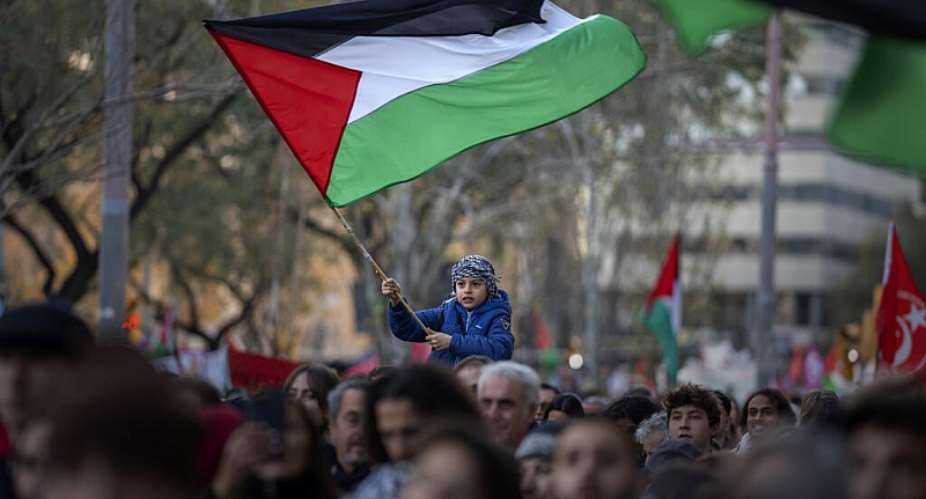Reaction has been sharply divided after three European countries said they would officially recognise the state of Palestine, more than seven months into the devastating Gaza war. While Israel responded with fury, Palestinian authorities have hailed the move as historic – and urged France to follow suit.
Ireland, Spain and non EU-member Norway each said on Wednesday they would formally recognise a Palestinian state from May 28, drawing praise from many Arab and Muslim countries.
"These countries have been contemplating the possibility of recognizing the state of Palestine for a long time," said Jean-Paul Chagnollaud, head of the Institute for Middle East and Mediterranean Studies and Research (iReMMO).
"Norway played a significant role during the Oslo Accords, and Spain also played an important role in these same accords by organising the Madrid Conference beforehand," he told RFI.
But Israeli Prime Minister Benjamin Netanyahu said the move amounted to a "reward for terror", after Palestinian militant group Hamas launched the 7 October attack that sparked the Gaza war.
Israel said it was recalling its envoys to Dublin, Oslo and Madrid for "urgent consultations" and also summoned the three European ambassadors for a rebuke.
'Never a better time'
Meanwhile Hamas welcomed the recognition as an "important step", and the Palestine Liberation Organisation, led by President of the Palestinian Authority Mahmoud Abbas, called it an "historic" moment.
Hala Abou Hassira, the Palestinian Authority's representative in France, said: "There was never a better time."
"Spain, Ireland, and Norway have proven that it is always a good time to do the right things," she told RFI.
The three countries "are committed to the two-state solution, committed to justice, and their position is in complete coherence and conformity with the principles of international law and United Nations resolutions", Hassira said.
But she also invited France to follow in "this positive movement towards peace and security for all".
France distanced itself from Ireland, Spain and Norway after Wednesday's announcement, saying that conditions were not right to recognise a Palestinian state and that such a decision must be more than a symbolic gesture or political posturing.
"France does not consider that the conditions have yet been met for this decision to have a real impact on this process," Foreign Minister Stéphane Séjourné said after talks in Paris with his Israeli counterpart Israel Katz.
'Not taboo'
Paris has previously said recognising a Palestinian state is not taboo, but should be part of a broader effort to achieve a two-state solution between Palestinians and Israelis.
"Exactly ten years ago, the French Senate and National Assembly asked the government to recognise the state of Palestine," explained Chagnollaud. Now, those resolutions are "somewhat forgotten but must be remembered", he said.
"It's a debate that has often been raised and then abandoned in recent years, because the Palestinian question was considered marginalised," Chagnollaud said.
"But 7 October woke all this up. And everything that followed made it clear that a political solution is urgently needed."
To date, EU members Cyprus, Bulgaria, Hungary, Poland, Romania, Slovakia and Sweden have recognised a Palestinian state. Malta and Slovenia have said they are considering doing the same.
European Union foreign affairs chief Josep Borrell said this week that he would work with the bloc's 27 members "to promote a common EU position based on a two-state solution".
And the White House said US President Joe Biden opposed unilateral recognition of a Palestinian state, saying it should be realised "through direct negotiations".





 Go to court, I cannot retract the truth – Ablakwa replies Freddie Blay
Go to court, I cannot retract the truth – Ablakwa replies Freddie Blay
 Ambulance Trial: Godfrey Dame must heed Judge's advice — Appiah-Kubi
Ambulance Trial: Godfrey Dame must heed Judge's advice — Appiah-Kubi
 Jomoro: Chief urges government to rehabilitate cocoa roads at Tikobo No 2
Jomoro: Chief urges government to rehabilitate cocoa roads at Tikobo No 2
 Ghana marks Eid-ul-Adha
Ghana marks Eid-ul-Adha
 Eid-ul-Adha: Mahama appeals for prayers to win Election 2024
Eid-ul-Adha: Mahama appeals for prayers to win Election 2024
 Take IPAC relationship seriously to avert repetition of voter transfer challenge...
Take IPAC relationship seriously to avert repetition of voter transfer challenge...
 “We've economic challenges, power outages but not consumed” — Afenyi-Dadzie
“We've economic challenges, power outages but not consumed” — Afenyi-Dadzie
 Retract, apologise over Labadi beach front claims — Freddy Blay to Ablakwa, John...
Retract, apologise over Labadi beach front claims — Freddy Blay to Ablakwa, John...
 Ghana bleeding terribly — Mahama reacts to death of abandoned patient
Ghana bleeding terribly — Mahama reacts to death of abandoned patient
 S.Africa's Ramaphosa to announce 'inclusive' coalition cabinet
S.Africa's Ramaphosa to announce 'inclusive' coalition cabinet
